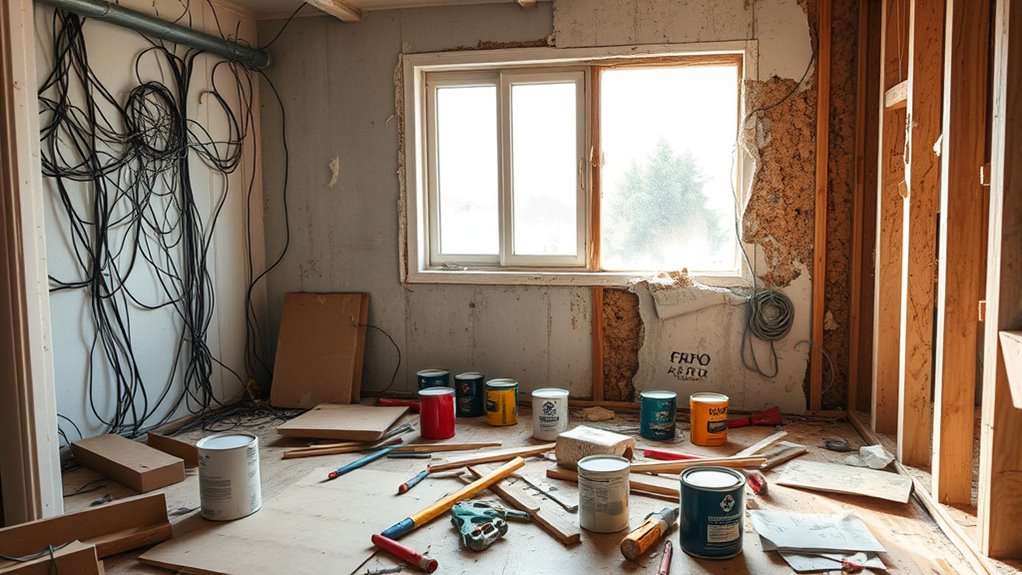To avoid costly mistakes, set a realistic, detailed budget early and include a contingency fund. Carefully select reliable contractors with good reviews, verifying licenses and insurance. Take your time comparing bids and ask questions about their experience. Prioritize high-quality materials for durability, and plan thoroughly to prevent delays. Managing conflicts and sticking to your plan will keep your project smooth. Keep these tips in mind to guarantee success—and if you continue exploring, you’ll discover even more valuable insights.
Key Takeaways
- Set a realistic budget, including a contingency fund, and track expenses regularly to prevent overspending.
- Choose reliable, licensed contractors with proven experience, and verify references before signing a contract.
- Avoid rushing decisions; compare multiple bids and ask about potential challenges to ensure transparency.
- Select high-quality, durable materials to reduce future repairs and ensure long-term safety and longevity.
- Plan thoroughly, research thoroughly, and communicate clearly to prevent delays, conflicts, and costly mistakes.

Beginning a home renovation can be exciting, but it’s easy to make mistakes that cost time and money. One of the most common pitfalls is facing budget overruns, which can quickly turn a dream project into a financial headache. To avoid this, it’s essential to set a realistic budget from the start and include a contingency fund—typically 10-20% of your total expenses—to cover unexpected costs. Sticking to your budget requires diligent planning and regular tracking of expenses, so you’re aware of any deviations early on. If you find yourself overspending, reassess your priorities or look for cost-effective alternatives rather than stretching your finances further.
Set a realistic renovation budget with a contingency fund to prevent unexpected costs.
Another key factor that impacts your renovation’s success is contractor selection. Choosing the right contractor isn’t just about finding someone who offers the lowest price; it’s about finding a reliable professional with a proven track record. You should do thorough research, read reviews, and request references to gauge their reputation. Meeting potential contractors in person allows you to assess their communication style and professionalism. Always verify licenses and insurance to protect yourself from liability and subpar workmanship. Remember, a good contractor will provide a detailed, written estimate that clearly outlines costs, timelines, and project scope. Don’t settle for vague promises or verbal agreements because they can lead to misunderstandings and disputes down the line.
When selecting a contractor, avoid rushing the decision. Take your time to compare multiple bids and ask questions about their experience with similar projects. Be wary of contractors who pressure you to sign quickly or who ask for large upfront payments. Trust your instincts—if something feels off, keep looking. A reputable contractor will be transparent about potential challenges and communicate regularly throughout the project. Keep in mind that poor contractor selection often results in delays, subpar work, or inflated costs, all of which can derail your renovation plans. Conducting a thorough contractor background check can save you from future headaches. Additionally, understanding the importance of contractor reputation can help you make more informed choices and avoid costly mistakes.
Furthermore, considering material quality when planning your renovation ensures that you invest in durable and cost-effective solutions, reducing long-term maintenance costs. Selecting high-quality materials, such as fire-resistant and durable options, can significantly enhance the safety and longevity of your renovation. In the end, avoiding these common mistakes comes down to careful planning and thorough research. Set a firm budget with a buffer for surprises, and don’t compromise on vetting your contractor. Being aware of potential personality-related challenges can also help you navigate conflicts smoothly. With patience and due diligence, you’ll reduce the risk of costly setbacks and enjoy a smoother, more successful home renovation experience. Remember, taking the time to make informed decisions upfront can save you significant stress and expense later on.
Frequently Asked Questions
How Do I Choose the Right Contractor for My Project?
When choosing a contractor, start with thorough contractor vetting—check references, reviews, and portfolios. Make certain they understand your project scope and align with your budget estimation. Ask for detailed quotes to compare costs and avoid surprises later. Trust your instincts and communicate clearly. A reliable contractor will be transparent, responsive, and open to discussing your needs, ensuring the project stays on track and within your budget.
What Are Common Hidden Costs During Renovation?
Hidden costs during renovation can sneak up like shadows in the night. Unexpected expenses such as permit fees, material price hikes, or labor adjustments often catch homeowners off guard. To stay ahead, you need solid contingency planning—setting aside a buffer fund that covers surprises. Keep a close eye on every detail, and don’t forget to ask your contractor about potential hidden costs to avoid being blindsided at the finish line.
How Can I Prioritize Renovation Projects Effectively?
To prioritize your renovation projects effectively, start with solid budget planning to determine what’s feasible. Then, create a detailed project schedule, identifying which tasks need immediate attention and which can wait. Focus on projects that add the most value or improve safety first. By balancing budget constraints with a clear timeline, you make sure your renovation stays organized, efficient, and aligned with your overall goals.
What Permits Are Required for Home Renovations?
Did you know that nearly 60% of renovation projects face delays due to permit issues? You’ll want to check local permit requirements before starting your project. Renovation permits are often needed for structural changes, electrical work, or plumbing. To avoid fines or work stoppages, contact your city’s building department early and verify you obtain all necessary permits. This way, your project stays on track and compliant with regulations.
How Do I Manage Renovation Timelines and Delays?
You should create a detailed project schedule to manage renovation timelines effectively. Regularly monitor progress and stay in close contact with your contractor to identify potential delays early. Implement delay mitigation strategies like flexible deadlines or alternative suppliers. Keeping communication open and adjusting plans proactively helps you stay on track, avoid surprises, and guarantee the project finishes within your desired timeframe.
Conclusion
By avoiding these common home renovation mistakes, you’ll save yourself from chaos that can feel like an earthquake shaking your entire life. Remember, planning carefully and sticking to your budget keeps your project from spiraling into a nightmare. Think of your renovation as a masterpiece—every mistake avoided is a brushstroke towards perfection. Stay vigilant, be patient, and don’t rush. With the right approach, your dream home will become a reality, brighter and more beautiful than you ever imagined.









